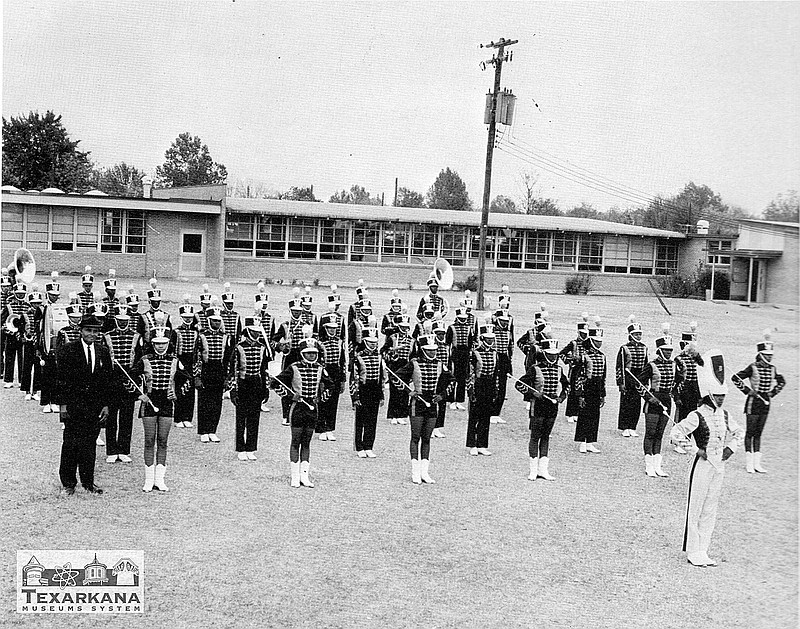TEXARKANA - For one Texarkana native, the history of educational integration here proved to be fertile territory for scholarship and historical reflection.
Katherine Doan graduated with degrees from the University of Texas at Austin, and part of her studies included a thesis about integration at schools on both sides of the state line, in addition to Texarkana College.
Early this month, she discussed her findings in a program at the Museum of Regional History. She's a fifth-generation native Texarakanian and 2015 graduate of Texas High School.
Doan's scholarship, which she completed in 2019 as part of a Plan II honors program degree at UT's College of Liberal Arts, combines research of school board minutes, newspaper archives and oral history interviews of people who were students and teachers during integration.
In her thesis, Doan writes that although there are "landmark events" that signify desegregation's struggles across the nation, her approach was to go local with a decades-long narrative of desegregation as it played out here."Instead of remembering the history of school desegregation as its few moments of national notoriety, it should be remembered as it unfolded uniquely in communities across the nation. By understanding integration as it impacted individual cities, its modern vestiges can be identified and hopefully eliminated," she wrote.
While here to talk about her studies, Doan said, she enjoyed an engaging conversation with attendees at the MoRH. "It was my first time speaking about it in Texarkana," she said. She's talked about her thesis in Austin, where she said the topic of Texas desegregation is of interest.
"But it wasn't as personal as speaking about it here," Doan said. To speak about the history here and talk about it here had a particular resonance.
"It was nice to revisit it in the context of the place where it happened and knowing that the people in the audience attended these schools or have children that went to these schools," Doan said. One of the museum officials spoke about how her aunts and uncles attended the Dunbar school but then transferred to Texas High.
"What a shift that was for the family and the community that they experienced at Dunbar, and just her personal experience with what I had academically researched, which made it a lot of richer," Doan said. "It definitely was a special experience. I was grateful for the opportunity."
Her Plan II studies also involved classes about memoir and memory, plagues and their effect on history, Napoleon and Russia and theoretical physics.
"It was a wonderful education, and you were required to write a thesis as kind of a capstone project. Very open-ended, so I had friends who wrote symphonies for their thesis," Doan recalled.
It was this project that engaged her with integration in her hometown. A class on education reform made her think about the quality of education across socio-economic factors, gender and race, specifically.
As one of the few students in Plan II who had attended public schools, she was inspired to explore this background as related to Texarkana, in particular Advanced Placement programs and the racial disparity seen there.
At the time she was a local student, she says, she suspects she was blissfully ignorant of this. The education reform class opened her eyes to reality."Then considering what happened in between my grandfather graduating from Texas High and my mother graduating from Texas High in that little period of integration, and how that affects today with my educational experience and how stratified that was, that was something I was really interested in exploring," said Doan, who, in addition to her bachelor of arts in Plan II and French, earned a bachelor of science in computational engineering.
She's now a business analyst for General Motors, which is essentially an IT business analyst job, rather than the humanities she loves. Still, she's been able to present her research studies around Austin.
Her mother became a source for what exactly happened in that time. "She started Kennedy Elementary first grade in 1970, so it was completely integrated," Doan said. Her grandfather, though, graduated the year of the Brown vs. Board of Education court decision.
"The turmoil in the middle is what I was really interested in, that kind of generational gap for my family," Doan said about the area she aimed to explore.
Her favorite part of the research was interviewing students and teachers from the integration era. She recalls cold-calling people she tracked down via the Internet. There were dead ends, but the people who talked shared a wealth of information.
"One of the most interesting things that I learned was just how everyone I spoke to firmly believed that desegregation was OVERSET FOLLOWS:necessary, that desegregation was ultimately the right thing that happened and that desegregation has benefited the community and the education of Texarkana and the nation as a whole," Doan said. "What I didn't expect, there was this sense of loss of community from the Black schools."
Former students and teachers who attended Dunbar or Washington schools in Texarkana, they recalled going to school with teachers who also went to church with them and knew their parents. There were relationships there.
"It really was Black students uprooting and leaving their schools and their neighborhoods and going to white schools primarily," Doan said. With a couple of exceptions, that was how it happened.
"Because they were so severely unwelcome at the white schools in the '70s and kind of going on, it was a deep loss of community," she explained.
Doan talked with one Dunbar attendee who spoke fondly of the education there, the Rev. Tony Patterson, who then graduated from Texas High in 1969. He discussed Dunbar's relevance to his family.
"It was the place that my father had gone to school and graduated from, and my mother was a teacher there, a home economics teacher. And so it really meant quite a bit to me to be there in that atmosphere, and in that surrounding. It was something I had been looking forward to for most of my childhood life," Patterson told her, according to her thesis.
There were specific students and class years who bore the brunt of this transition, she said. It should be remembered and appreciated, she believes.
"This loss of position meant the loss of years of work within the Black schools, immediately setting the precedent that, regardless of former successes, Black students would not be incorporated into white organizations until they had proven their 'merit.' Identities, founded in team affiliation and leadership positions, were eviscerated along with the schools that helped developed them," she wrote in her thesis.
With this scholarship accomplished, she'd like it to be useful.
"I hope that future generations are able to have this as an integral part of Texarkana history, but also Texas and Arkansas history, as a whole. I think it's a really interesting look at kind of an American microcosm because you do have two state governments at play," Doan said. "You have two school districts that handled it very differently and all of that affecting one single community."
It's unique, she says.
"You can read this and you can see what some schools did and what some schools didn't do, whether that was good or bad," she said, "In a really close-knit, comparative way."
As well, Doan wants this document to be here with people's own words, the board minutes and Texarkana Gazette archives set down for the record. "These generations that experienced this, they won't be here forever," she said, noting those interviews she conducted gave insight not found elsewhere.
The research presents different sorts of information to give a more complete narrative. Combined, it's a rich overview of what happened.
"When I was speaking to people, when I was doing my interviews and asking them about their specific experiences, there was so much that they experienced first-hand that would never be written in the records. And there was so much written in the records that they didn't experience and didn't remember," Doan said.
(On the Net: equalbutseparated.com.)



